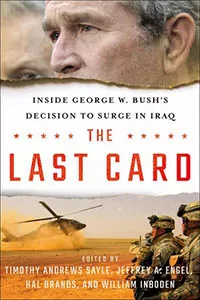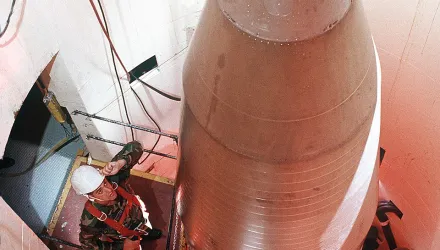Note
Jacqueline L. Hazelton reviews Timothy Andrews Sayle, Jeffrey A. Engel, Hal Brands, and William Inboden (eds.). The Last Card: Inside George W. Bush's Decision to Surge in Iraq. (Cornell University Press, 2019).

This book belongs on the desk of anyone studying or teaching U.S. foreign policy, great power military interventions, the presidency, national-security decision-making, civilian-military relations, U.S. history, or strategic studies. The Last Card: Inside George W. Bush’s Decision to Surge in Iraq, edited by Timothy Andrews Sayle, Jeffrey A. Engel, Hal Brands, and William Inboden, is unlikely to change any minds on the outcome of the 'surge' in Iraq as a success or failure. It provides food for thought, however, on the processes, mindsets, and choices of those shaping the field for the 'decider,' President Bush, ahead of his gamble for resurrection, Hail Mary pass, or last throw of the dice regarding the U.S. occupation in Iraq and his reputation as a wartime president. The interviews in the first half of the volume are rich with interesting perspectives, though, as Robert Jervis points out in his essay in the second half of the book, there are good reasons to not take recollection for fact.1
What is most striking in these interviews is the absence of Iraqis. Iraqi actors, groups, interests, and agency are almost entirely lacking in the analyses and calculations of the U.S. officials who were interviewed. The policymakers consider neither the structures nor the individual choices driving the multiple Iraqi sides of the equation....
1 Robert Jervis, "Decisions and Politics," in Timothy Andrews Sayle, Jeffrey A. Engel, Hal Brands, and William Inboden, eds., The Last Card: Inside George W. Bush's Decision to Surge in Iraq (Ithaca: Cornell University Press, 2019) [Hereafter The Last Card]: 260–276.
Hazelton, Jacqueline L. " H-Diplo Roundtable XXII-7 on The Last Card: Inside George W. Bush's Decision to Surge in Iraq." H-Diplo, (October 12, 2020).





